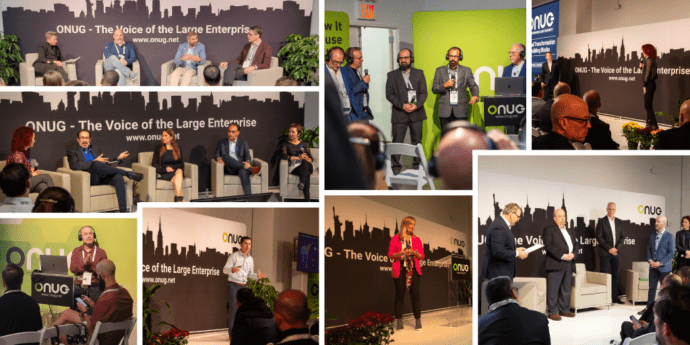
Enterprise AI at Scale: Governance, Innovation, and Human Impact
This blog summarizes the AI Networking Summit in NY’s Fireside Chat with Berta Rodriguez Hervas of Pfizer and ONUG’s Nick Lippis. For a full recording of the session, visit here
The integration of Artificial Intelligence (AI) into healthcare is rapidly transforming drug discovery and patient outcomes. Bertha Rodriguez, Chief AI and Analytics Officer at Pfizer, shared valuable insights into the company’s decade-long journey with AI, highlighting both the immense potential and the practical challenges of scaling AI adoption within a large enterprise.
The Promise of AI in Drug Development
Drug development is an incredibly complex process, involving vast amounts of information, intricate regulations, and extensive collaboration. AI, particularly generative AI and agent-based workflows, is proving to be a game-changer in simplifying and accelerating this process. Rodriguez emphasized the excitement around “knowledge mining” applications, which empower scientists to parse more information, connect disparate data points, and navigate complex knowledge landscapes more efficiently. This allows human experts to focus on critical decision-making rather than spending countless hours wrangling data.
Beyond knowledge mining, AI is also being utilized for process improvement and model simulation in drug discovery. The combination of predictive and generative AI workflows enables scientists to simulate the probability of success for new drug targets and proposals, and to understand potential shortcomings, leading to more informed and effective development strategies.
Navigating the Challenges of AI Adoption at Scale
While the benefits are clear, scaling AI within a large, established organization like Pfizer, which has been around for over 170 years, presents unique challenges. Rodriguez, who previously worked at AI-native companies like Tesla and Nvidia, noted the stark difference between pilot projects and scaled-up applications.
One of the biggest lessons learned is the critical importance of a robust data strategy. “Data will be the most important investment,” Rodriguez stated, emphasizing that the success of any AI journey hinges on a company’s ability to organize, understand, and modernize its data infrastructure. This includes bringing data to protected clouds and ensuring secure and accessible data flows.
Another significant hurdle is “change management.” Unlike AI-native companies where the workforce is inherently familiar with AI, traditional enterprises need to bring their entire organization along on the AI journey. This requires extensive education and demystification of AI, addressing both healthy skepticism and the “not-so-healthy amount of resistance” that can arise from concerns about job displacement. The goal is to help employees understand how AI can transform their work effectively, rather than viewing it as a threat.
Finally, effective AI adoption requires a balanced approach that bridges the gap between high-level executive mandates and bottom-up initiatives. While CEOs champion AI, individual teams often implement small-scale AI solutions that don’t fully realize the transformative potential. True transformation, Rodriguez argues, necessitates rethinking entire processes across multiple groups and sub-teams with AI at the core.
In conclusion, Pfizer’s experience demonstrates that while AI offers unprecedented opportunities for innovation in healthcare, its successful integration demands significant investment in data infrastructure, a comprehensive change management strategy, and a holistic approach to reimagining workflows across the entire organization.


